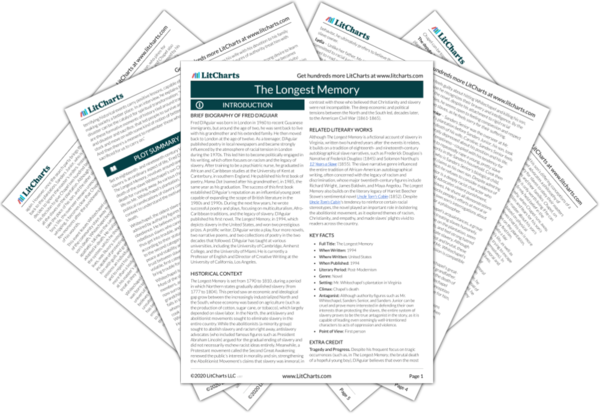Mr. Whitechapel Quotes in The Longest Memory
“This inhuman display parading as discipline is a regular occurrence on these so-called ‘tightly run’ operations. I tell you all the evidence supports my belief that as a long-term measure it is a disaster. Contrary to their arguments, such rough handling provides rougher responses. The human spirit is passive in some but nature shows us that it is rebellious in most.”
“Africans may be our inferiors, but they exhibit the same qualities we possess, even if they are merely imitating us. Their management is best exemplified by an approach that treats them first and foremost as subjects of God, though blessed with lesser faculties, and therefore suited to the trade of slavery.”
“Whitechapel, you even got a mention in The Virginian.”
“The death of one slave does not make me one of you.”
“True, Whitechapel, true, it does not; it makes you a fool.”
“And, after all you’ve said, a hypocrite too. ‘The slaves have rights as humans; they are not just tools.’”
“What about this? ‘Show them respect and they’ll work hard.’”
“‘They may be inferior but they’re people like us.’ Lost your tongue, Whitechapel?”
Your policy of a judicious whip failed to save him. There is only one whip, it eats flesh.
“Our line of work is slaves, we can’t change the fact. We do it the way we think best serves our investment.”
“It’s not a charity.”
“We are Christians but Christianity does not equal weakness.”
“We treat our slaves with a firm hand, we’re severe in the hope that other slaves will behave well out of fear.”
“How could your Whitechapel watch and not intervene?”
“He lost a son in deference to authority.”
“Name your price. That slave of yours is a slaver’s dream.”
“He’s still not for sale.”
“He deserves your family name.”
“Well said indeed.”
“If he were white he’d still be rare.”
“Let’s drink a toast. To Whitechapel and to his slave.”
“By teaching little Whitechapel to read and write when he can never use it you have done him the gravest injustice.” I want to reply that a law which says a slave should not read and write is unjust. But I look at my feet and nod when he enquires whether I have heard every word. He said it might be possible in the future. I look up at him and, as if to dash my hopes of a future when Chapel and I could sit and read together, he adds, in the next century, perhaps.

Mr. Whitechapel Quotes in The Longest Memory
“This inhuman display parading as discipline is a regular occurrence on these so-called ‘tightly run’ operations. I tell you all the evidence supports my belief that as a long-term measure it is a disaster. Contrary to their arguments, such rough handling provides rougher responses. The human spirit is passive in some but nature shows us that it is rebellious in most.”
“Africans may be our inferiors, but they exhibit the same qualities we possess, even if they are merely imitating us. Their management is best exemplified by an approach that treats them first and foremost as subjects of God, though blessed with lesser faculties, and therefore suited to the trade of slavery.”
“Whitechapel, you even got a mention in The Virginian.”
“The death of one slave does not make me one of you.”
“True, Whitechapel, true, it does not; it makes you a fool.”
“And, after all you’ve said, a hypocrite too. ‘The slaves have rights as humans; they are not just tools.’”
“What about this? ‘Show them respect and they’ll work hard.’”
“‘They may be inferior but they’re people like us.’ Lost your tongue, Whitechapel?”
Your policy of a judicious whip failed to save him. There is only one whip, it eats flesh.
“Our line of work is slaves, we can’t change the fact. We do it the way we think best serves our investment.”
“It’s not a charity.”
“We are Christians but Christianity does not equal weakness.”
“We treat our slaves with a firm hand, we’re severe in the hope that other slaves will behave well out of fear.”
“How could your Whitechapel watch and not intervene?”
“He lost a son in deference to authority.”
“Name your price. That slave of yours is a slaver’s dream.”
“He’s still not for sale.”
“He deserves your family name.”
“Well said indeed.”
“If he were white he’d still be rare.”
“Let’s drink a toast. To Whitechapel and to his slave.”
“By teaching little Whitechapel to read and write when he can never use it you have done him the gravest injustice.” I want to reply that a law which says a slave should not read and write is unjust. But I look at my feet and nod when he enquires whether I have heard every word. He said it might be possible in the future. I look up at him and, as if to dash my hopes of a future when Chapel and I could sit and read together, he adds, in the next century, perhaps.











